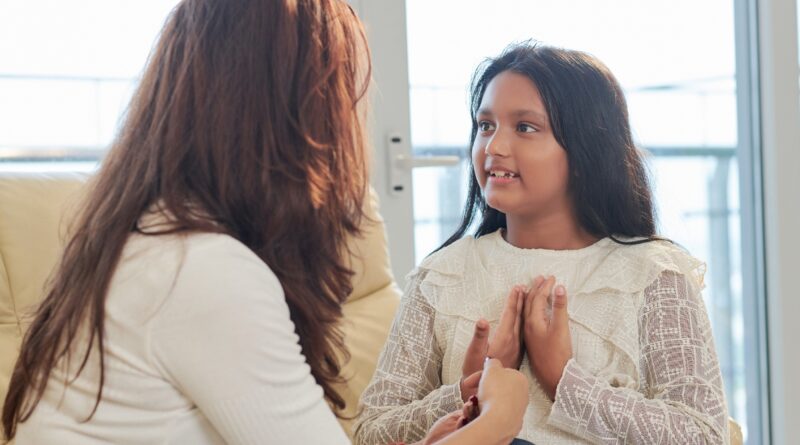Why it’s important to talk to your kids about donor conception
In the ever-evolving landscape of modern families, the concept of donor conception has become a reality for many parents. Families built with the assistance of egg or sperm donation include not only those with infertility related to egg or sperm quality, but also people with genetic conditions, single parents by choice, and those in the LGBTQIA+ community.
Navigating the balance between transparency and privacy is often challenging for intended parents who recognize the importance of discussing donor conception with their children—but feel unsure about where to begin. As both a family-building professional and a parent through donor conception myself, I can offer a unique perspective to help you navigate this journey.
Why we need to talk about donor conception
Once you make the life-changing decision to have a child with the help of a gamete donor, you enter a new world. This unique path to parenthood requires you to make complex decisions, think carefully about the future of your family and how you will share information about the donor with your child and others.
While the amount of resources available to those pursuing donor conception is slowly growing, recipient parents are still often left with a long list of unanswered questions and concerns.
How should I tell my child about their donor? When? Where can I turn for support?
Engaging in open, honest communication about how your family was formed is not only beneficial, but essential for fostering trust, understanding, and a strong sense of identity in donor-conceived children. Remember, at this point in the journey, your primary goal is to achieve a pregnancy—later on, that primary goal will be to foster the growth of a healthy, well-adjusted child and young adult.
Let’s explore the intricacies of donor conception and how to have conversations with your children about their genetics.
Building a foundation of trust
At the heart of any healthy parent-child relationship lies a strong foundation of trust. When children hear about their donor conception story from an early age, it establishes a culture of openness and honesty within the family.
Rather than stumbling upon the truth later in life, children raised with knowledge regarding their genetic background are likely to feel secure in their familial bonds. Trust becomes a cornerstone, allowing for a deeper connection between parents and children.
I recommend starting the conversation with your child when they are still in your arms. This gives you (and your partner, if applicable) the opportunity to get comfortable telling the story of how they came to be in an authentic, truthful way.
Navigating curiosity and questions
Children are naturally inquisitive beings. As they grow, so does their curiosity about the world around them—including their own origins.
Don’t wait for your child to start asking questions. Initiate the conversation and make sure that the dialogue is positive and authentic. At appropriate moments, bring up that very special person who donated those special cells that helped bring the child to your family. Leave the door open for questions after that moment—you may be surprised at what comes up.
Talk favorably about your donor, so it is always a positive concept. Open communication enables parents to guide their children through the complexities of their story, helping them process information and emotions about how they came to life. This will help them develop a healthy perspective on their unique family dynamics.
Developing emotional resilience
Open communication about donor conception equips children with a level of emotional resilience. Understanding and accepting their story from a young age enables them to navigate their development of self with confidence and always knowing that they were loved and wanted.
As they encounter questions or misconceptions from peers or others, children armed with a solid understanding of their life story can respond with self-assurance, reinforcing a positive sense of self.
How to talk about donor conception with your kids, by age
By proactively addressing your family building/donor conception narrative, parents create a safe space for their children to ask questions and seek understanding. However, many parents often wonder: What should I tell my child? How much is too much to share? How will I know when they are ready for more advanced information about their story?
What you choose to share will largely depend on the developmental stage of your child. Let’s walk through the childhood years together and explore how to have age-appropriate conversations about donor conception.
Ages 0 to 2
While your child is an infant and toddler, focus on bringing elements of conception and family diversity into their play. Draw your family and point out each member. Read engaging picture books about how babies come into the world and how families grow. Talk about how babies don’t only come from a tummy, but from the combination of special cells that came together to make them.
Ages 2 to 5
As your child develops more cognitive and language skills, encourage short conversations and answer questions as they arise about your family. Offer brief explanations of your family structure that they can confidently use when needed, for example, “I don’t have a daddy like you, I have two mommies!” Likewise, if a surrogacy journey was part of your child’s story, talk about your surrogate openly and explain how she is part of your family as well. Your child will grow to know that there are many different types of families built out of love.
Ages 5 to 9
During this stage, children will begin to put the pieces together in a more mature way. They will also pick up on representations of family from external sources like television and social media. This will provide ample opportunity for conversation.
- Start with basic concepts: Explain that families are made in different ways, and some families, like yours, have a special story.
- Use age-appropriate language: For example, you might say, “To help us have you, we had help from a kind person who gave us some of their special cells.” If they ask, you can introduce the concept of sperm and egg.
Ages 9 to 13
Most children in this age range have well-developed abstract thinking abilities, which will lead to more nuanced questions and logical conclusions. Expect your child to progress from asking “what” questions (i.e. “What are egg and sperm cells? What is a donor? What does it mean to be donor-conceived?”) to “why” and “how” questions that help establish correlations.
For example, “Why did mom choose to use a sperm donor? Why don’t I have a dad? How does insemination work?” As a parent, your job is to welcome and encourage these new types of questions. Your child will also begin to reflect more deeply on their origin story, which may lead to a variety of emotions.
The role of the parent is to remain supportive of the child as they reflect on and evolve their thinking around donor conception. Stay open and curious about positive, as well as potentially critical, thoughts that your child may be having. This willingness to accept the full breadth of what your child is thinking and feeling should be sustained through adolescence.
The evolution of parent-child communication
The act of sharing the donor conception story is not just a one-time conversation, but an ongoing dialogue that will shift and change as your child grows. Creating a safe, welcoming environment where your child feels comfortable to approach you with questions about their origins encourages a continuous thread of connection, strengthening familial bonds over time.
Discuss with your child how much they were wanted and are loved. You worked harder than most to conceive them, and loved them even before they were even a tiny flicker on an ultrasound monitor. Remind them that you are always on their side, and will help them navigate their feelings, potentially meeting the donor or donor siblings, arm in arm.
Your family IS different, and is an expression of love and intention.
Related: How do I find the right sperm donor?
Donor conception resources for parents
As a father to two children through egg donation and surrogacy myself, I have experienced firsthand how challenging it can be to navigate these conversations.
This led me to co-author the forthcoming book, Building Your Family: The Complete Guide to Donor Conception (November 2023) with Lisa Schuman, a fellow family-building expert and parent through donor conception. This book is the first all-inclusive guide by experts that covers both the medical and emotional aspects of becoming a parent to a donor-conceived child.
Other helpful resources for hopeful parents pursuing donor conception include:
- If These Ovaries Could Talk: The Things We’ve Learned About Making an LGBTQ Family by Jaimie Kelton and Robin Hopkins
- Your Future Family: The Essential Guide to Assisted Reproduction by Kim Bergman, PhD
- The Donor Conception Conversations podcast
Exploring donor-conceived perspectives
An essential aspect of this process is taking the time to understand how being a donor-conceived person (DCP) impacts not only the child, but the future teenager and adult that child will become. Listening to DCPs about their experiences and feelings around having a donor (and how their parents had these conversations with them) is an important step of the process.
There are a growing number of resources (including articles, research, and online communities) focused on the perspectives of donor-conceived people. Here are a few to explore:
- Donor Conceived Community: Nonprofit providing support and education for DCPs
- We Are Donor Conceived: Resource center for DCPs across the globe
- There Are No More Secrets in Sperm Donation: An examination of DCP stories and the end of anonymous donation
Children’s books about donor conception
When children learn about their unique genetic histories throughout their lives, instead of uncovering this information as a teenager or adult, they are encouraged to have pride in who they are. Reading with your child about donor conception from a young age is an excellent way to build the foundation for open, honest communication.
Below are a few recommendations to get you started:
- What Makes a Baby by Cory Silverberg
- Love Makes a Family by Sophie Beer
- Lilly’s Blueprints: A Donor Conception Story by Sharon Leya
- The Pea That Was Me: An Egg Donation Story by Kimberly Kluger-Bell
- Zak’s Safari: A Story About Donor-Conceived Kids of Two-Mom Families by Christy Tyner
Beginning the conversation
Embracing the role of donor conception in your family-building journey is a transformative and empowering choice—for both parent and child. By fostering trust, a sense of belonging, and open channels for questions, parents can create an environment where their children can thrive emotionally and develop a strong sense of identity.
As we continue to discuss what constitutes a family, acknowledging and celebrating these unique narratives contribute to a more inclusive and understanding society. It is through these open conversations that we pave the way for a future where every child feels secure, accepted, and proud of their extraordinary creation story.




